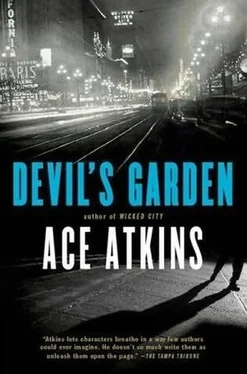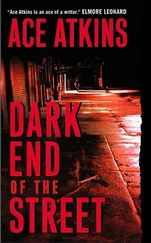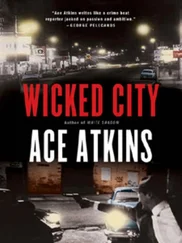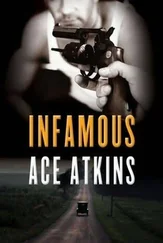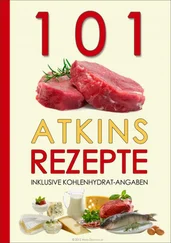Bootleggers always had phones.
“Okay.”
“Said it’s important.”
“Okay.”
Sam took the call. It was Phil Haultain.
“I got a bead on the Zey Prevon girl. She’s working at the Old Poodle Dog.”
“I’ll meet you there.”
The fog rolled in before midnight, flooding in from the bay and along the docks and Embarcadero, sinking the lower maze of San Francisco in a fine mist. Hammett had his tweed jacket on, collar popped up around his ears, and his sporting cap down far on his head. He walked Leavenworth through the curving fog up to Bush, coughing a spot of blood into a crisp handkerchief, and then up Bush and over Nob Hill, passing the Hell’s Gate of Chinatown and smelling the garlic and cooked chickens and fresh-cut flowers, and then down a ways, his breath strangled again as he descended back into the static of fog, and toward Bergez-Franks’s OLD POODLE DOG sign, lit up with spotlights, and a line of cars that stretched from the front portico down Kearny to Market. Most of the men had on expensive suits with high collars and bow ties, and the women wore tight long dresses and furs and large hats that trailed large, expensive feathers.
Sam tucked his cap into the side pocket of his coat and ran his hand over his white hair to smooth it down a bit. He just hoped no one noticed his laced boots, which could use a good shine.
He walked ahead of the line of sedans and touring cars and little black Fords and into the restaurant. He soon found Phil Haultain back by the kitchen, most of the diners sitting behind curtains in honeycombed rooms where waiters responded to a buzzer to keep a bottle or a mistress private. Downstairs you’d find roulette wheels and blackjack tables and games of faro, and a long hand-polished mahogany bar that stopped serving whiskey only during the Quake.
Sam winked at Phil and followed the big man down a curving wood staircase and past a big door with a sliding view and into a wide-open basement nightclub, where a gathering of negroes played trumpets and trombones, banjos and guitar, in the New Orleans style. The negroes all wore tuxedos and tails and played the wild music with such dignity that Sam thought the whites in the room seemed slovenly by comparison.
Sam leaned against an ornate column, and Phil stepped up next to him as he took in the scene. A bar stretched from one end of the room to the other, with several oblong mirrors and an endless brass rail. Linen-covered tables filled the room. The dance floor a chessboard.
“She sells cigarettes and is wearing a dress above her knees.”
“How’s she look?”
“Face like a horse. A body that would do Mr. Ziegfeld proud.”
“You talk to her?”
“Just found her, like you said.”
“Good man.”
Phil looked away for a moment, dead-eyed, and then turned back. “Now, there’s someone you’d write home to Mom about.”
At the long wooden bar stood a tall blond woman, hair almost white, with bright-red-painted lips. She held her booted foot up off the floor on the brass rail in the manner of a man, her hair shorn above her shoulders and covering the right side of her face when she turned. She held a long fox coat across her arm.
The woman looked over the room and then matched stares with Haultain and Sam and smiled a bit, and cocked a dark eyebrow, taking away the curtain of hair over her eye and turning back to face the bar mirror and wall of booze. The shape of her wasn’t unknown, as she turned back to the bar, the coat before her now, in her long black skirt that hugged her well-proportioned fanny and legs.
“Sam?”
“I’m here.”
“Thought I lost you.”
Sam noted a man in black tails and bow tie, thick black mustache and hair split and plastered to the skull and hard-parted with grease. When he laughed, you could see at least an inch gap between his big teeth.
“H. F. LaPeer,” Phil said.
“You know him?”
“Biggest bootlegger in the city. How long you been in Frisco, Sam?”
“Since July.”
“That’s right, you came for that head-busting job on the docks.”
“What’s the story with LaPeer?”
“Most of the booze in town flows from him. Runs the good stuff from Canada and brings it ashore at Half Moon Bay. Cops here are well paid, and no one seems to want to stop his party.”
“He looks like he combs his hair with olive oil.”
“Doesn’t seem to bother the girl.”
The blond girl stood against the long bar now, in the middle of an endless row of men in black suits getting drinks for their women. She smoked down a cigarette and made it look elegant the way she balanced the cigarette while holding the fox coat.
Her eyes looked as soft as her lips.
“That’s her.”
“You bet it is.”
“Sam? Over there.”
Phil pointed out a girl wearing a white bodice covered in glinting toy gems flitting her way around the table with a cigarette box hung around her neck. The first image Sam had of Zey Prevon wasn’t of a horse but of a Boston terrier. The girl had a sharp nose and soft chin and large bulging eyes, the kind that seemed to be in fashion these days among the movie-picture types. But she was long-legged, with biscuit-colored skin and large round breasts that hung handsomely in the jeweled top when she would lean over the table and the laps of men to light their cigars and cigarettes. The men would guffaw and laugh, and then motion the little twirling girl onto the next gentlemen. Please repeat it, nice and slow, sister.
“Why’d you say she looked like a horse?”
“Horses are ugly.”
“Horses are beautiful,” Sam said. “Don’t you go to the track?”
“What kind of animal has big tits?” Phil asked.
Sam waited for the girl to finish up, and he was going to meet her before she hit the next big table. For just two seconds the negro band stopped on a pin and then launched into “Fidgety Feet,” and the girl moved on, counting out cash into her hand and then tucking a few bills into her brassiere.
Two steps forward, Sam moved on her.
But then two large men in flowing overcoats stepped between Sam and Zey Prevon, and he could see only the men’s broad backs and then the girl pleading and smiling in profile and then turning down her mouth and sauntering away, one of the beefy men grabbing her arm. The other showed his silver badge. Tom Reagan.
H. F. LaPeer was there now, talking to the policemen and falsely smiling. He pulled out a silver cigar case, offering the men a smoke, but the men obviously declined and instead told LaPeer a few things. LaPeer dismissed them with a wave of his hand, in the thick cigar smoke, the band launching into the first few bars of the “St. Louis Blues,” the men and women drunk and going wild with it. A little girl in a flowered dress bumped into Tom Reagan’s partner and he tried to strong-arm the girl before she leapt up a good two feet, wrapped her arms around his ox neck, and planted a kiss on his sizable forehead.
“Having fun?” Sam asked.
Tom turned and nodded. “Hammett.”
“When you’re through, we’d like to talk to Miss Zey here, too. Is it Prevon or Prevost?”
“The papers call me both,” the big-eyed cigarette girl said. “I guess you can put one of those things between the two.”
“A hyphen?” Sam asked.
“That’s it.”
“Who’s this?” Griff Kennedy, the other cop, asked, finally pushing off the little girl and wiping lipstick from his forehead.
“Pinkerton,” Tom said. “Helped me out on that Southern Pacific job last month.”
Griff Kennedy nodded. His hair looked to be the color and fiber of copper wire.
“Beat it, Pink,” Kennedy said. “We got business with this little lady.”
Читать дальше
